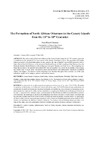Please use this identifier to cite or link to this item:
https://accedacris.ulpgc.es/jspui/handle/10553/77847
| Title: | The Formation of North African Otherness in the Canary Islands from the 16th to 18th Centuries | Other Titles: | La formación de la diferenciación norteafricana en Canarias de los siglos XVI al XVIII | Authors: | Santana Pérez, Juan Manuel | UNESCO Clasification: | 550302 Historia regional | Keywords: | Canary Islands Otherness North Africa Racism Ancien Régime, et al |
Issue Date: | 2020 | Journal: | Culture and History Digital Journal | Abstract: | The current study of the North Africans of the Canary Islands during the 16th-18th centuries represents a contribution to the question of the development of the Muslim stereotype in Spain. This population with origins almost exclusively in north-western Africa, an area known at the time as Barbary, was forcibly relocated to the islands. Most of the Old Christians at the moment of the Royal Decree of 1609 expelling of the Moriscos from the Peninsula declared that the Moriscos of the archipelago were good Christians and loyal vassals. The archipelago was hence the only area of the Spanish Crown where they were not expelled. Fear served the monarchies of new emerging modern state to secure power and fashion a proto-national identity that differentiated individuals of different cultures and religions. The Moriscos of the archipelago were therefore throughout three centuries one of the main collectives singled out for religious, political and economic reasons. El estudio actual de los norteafricanos en Canarias de Canarias durante los siglos XVI-XVIII representa una contribución a la cuestión del desarrollo del estereotipo musulmán en España. Esta población, cuyos orígenes se encuentran casi exclusivamente en el noroeste de África, un área conocida en ese aquel como Berbería, fue reubicada por la fuerza en las islas. La mayoría de los cristianos viejos, en el momento del Real Decreto de 1609 de expulsión de los moriscos de la Península, declararon que los moriscos del archipiélago eran buenos cristianos y vasallos leales. El archipiélago fue, por tanto, la única zona de la Corona Española de donde no fueron expulsados. El miedo sirvió a las monarquías del nuevo estado moderno emergente para asegurar el poder y forjar una identidad protonacional que habría de diferenciar a los individuos de diferentes culturas y religiones. Los moriscos del archipiélago fueron, por tanto y a lo largo de tres siglos, uno de los principales colectivos señalados por motivos religiosos, políticos y económicos. |
URI: | https://accedacris.ulpgc.es/handle/10553/77847 | ISSN: | 2253-797X | DOI: | 10.3989/chdj.2020.012 | Source: | Culture and History Digital Journal [2253-797X], v. 9 (2) |
| Appears in Collections: | Artículos |
WEB OF SCIENCETM
Citations
2
checked on Jan 18, 2026
Page view(s)
97
checked on Jan 10, 2026
Download(s)
64
checked on Jan 10, 2026
Google ScholarTM
Check
Altmetric
Share
Export metadata
Items in accedaCRIS are protected by copyright, with all rights reserved, unless otherwise indicated.
